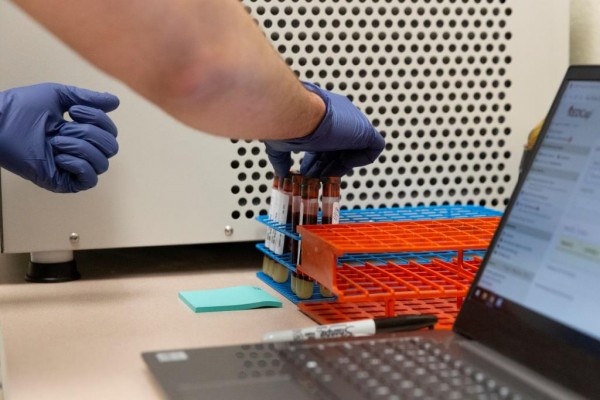New Cocktail of Antibodies Could Help Treat COVID-19

Francisco Soto, a research assistant at the University of Arizona, prepares blood samples for antibody testing for COVID-19 in Tucson, Arizona, US.
Researchers have recently identified a powerful cocktail of antibodies to possibly help doctors treat the fatal infections of COVID-19 and shield people who are at high risk of getting infected with the disease.
The said antibodies were taken from hospitalized patients suffering from a severe case of COVID-19. They would be made at a scale by pharmaceutical companies and transferred to blood to combat the contagion or stop it from staying.
Columbia University scientists examined antibodies from 40 patients with COVID-19. In connection to the study, the said researchers said, they "identified 61 types from five patients" that wiped out COVID-19 effectively.
Of these individuals, were nine patients who exhibited "exquisite potency" to counteract or nullify the pathogen.
ALSO READ: Potential COVID-19 Vaccine from University of Oxford Could Activate One's Immune Response
Virus-Killing Antibodies
Tests made on cells presented that the antibodies killed the virus offs while experiments with rodents exposed that an infusion of on the strong antibodies shielded animals from infection.
Essentially, it shut off the contagious virus totally in the treated hamsters' lung tissue. This was according to research head and medicine professor at Columbia University, David Ho.
Ho elaborated, they "specifically isolated very powerful antibodies" potential for mass production and eventually, administration.
The research head added, they would presume that the said antibodies could be used for the COVID-19 treatment.
He also explained that they'd be "looking to treat ahead in the course of contagious," specifically those at risk of acquiring serious illness like the older adults and those with underlying conditions.
DON'T MISS THIS: 20-Minute COVID-19 Blood Test Devised, Australian Researchers Announce
Alternative for Vaccines?
When it comes to prevention, Ho said, these could definitely alternate for vaccines, "And again, we would look at the most susceptible," for instance, residents of nursing homes.
Additionally, University of Toronto Professor, Sachdev Sidhu said, he has plans of taking neutralization of antibodies into clinical tests in the latter part of 2020.
In his opinion, the professor said, "The more antibodies, the better" since scaling them up, even though standard, still needs more time.
Sidhu also said, having several options would be ideal to guarantee that as many people as possible can get the treatments they need.
How Antibodies Contribute to COVID-19 Treatment
Antibodies are among the main lines of defence the body against viral contagions. Essentially, studies indicate, "when a virus enters the cells and multiplies," a person's immune system learns to acknowledge the trespasser and beats the antibodies out for the deactivation of microbe.
Furthermore, the antibodies strike from various angles, "securing on the proteins" from which virus is developed.
Pharmaceutical firm laboratories already devise antibodies in bulk, decontaminating them from cells that are developed in big fermenters.
Based on approximates, Ho, specified, "a dose of antibodies might amount to $50 to produce." He also said that work currently being carried out to examine all antibodies in animals.
Phase 1 Trial
Nevertheless, researchers are looking forward to synthesizing enough to introduce in October, a "phase 1 safety trial in humans."
If the said test finds that transfusions are safe, efficacy tests could begin in early 2021, explained Ho.
Antibodies can be designed, the expert explained, so that they can stay and persevere in the blood for up to six months.
Writing in Nature journal, the researchers described the manner most antibodies attach to what they described as "club-like 'spike' proteins" that cover the virus's surface.
These then, develop the "corona" from which the infection is taking its name. Some of the most vigorous antibodies beat the virus by securing the "spike protein" in a manner it could not invade human cells anymore.
IN CASE YOU MISSED THIS: How Effective Are COVID-19 Antibody Tests?
Jul 23, 2020 08:09 AM EDT




